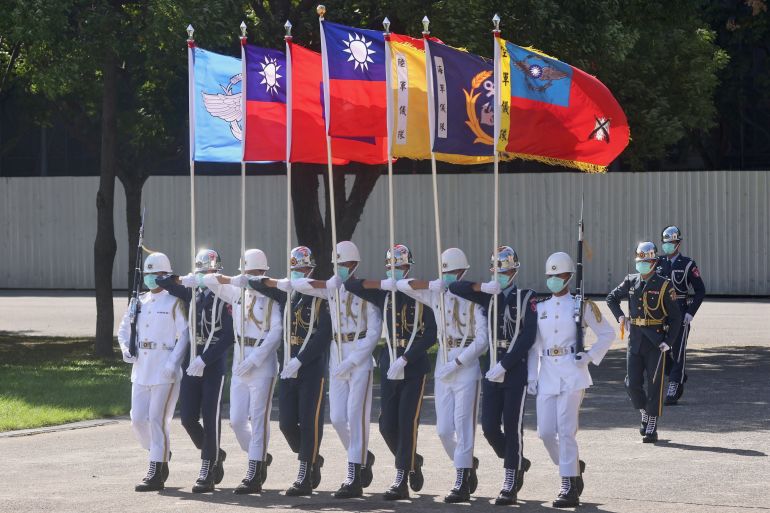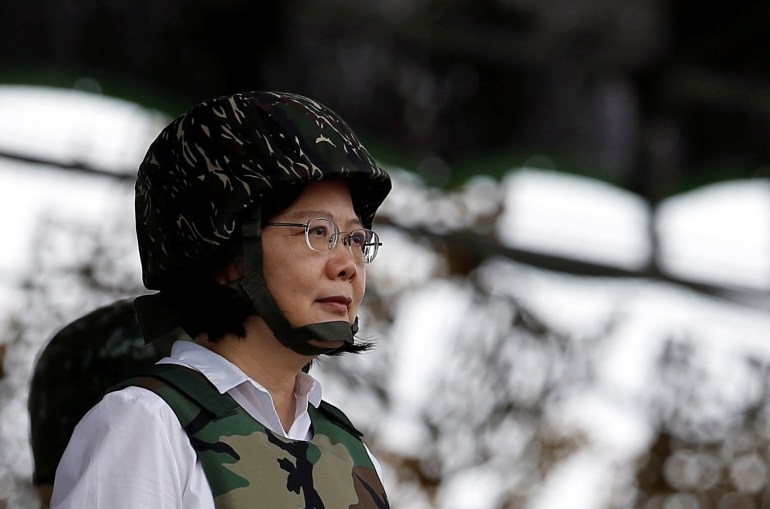Biden and Xi discuss Taiwan amid spike in cross-strait tensions
Call follows unprecedented Chinese air incursions and as Taiwan says relations at their worst in 40 years.

US President Joe Biden has said that he has spoken to Chinese President Xi Jinping about Taiwan after Beijing sent a record number of military aircraft into the self-ruled island’s air defence zone (ADIZ) and officials in Taiwan said ties were at their worst in 40 years.
Asked by a reporter about “China’s provocation over Taiwan”, Biden said on Tuesday that he and Xi had discussed the issue.
Keep reading
list of 4 itemsUS condemns ‘provocative’ Chinese military activity near Taiwan
Taiwan scrambles jets after largest ever incursion by China
Taiwan says it scrambled jets again after Chinese ‘air incursion’
“I’ve spoken with Xi (Chinese President Xi Jinping) about Taiwan,” Biden said at the White House. “We agree, we’ll abide by the Taiwan agreement, and we made it clear that I don’t think he should be doing anything other than abiding by the agreement.”
Taiwan said it tracked a record 56 Chinese aircraft in its ADIZ on Monday, in a series of military manoeuvres that began on Friday, China’s National Day, and prompted the island to scramble fighter jets in response. Beijing, which claims Taiwan as its own territory, has stepped up cross-strait activities this year, with the number of recorded incidents on track to be double the level of 2020.
On Wednesday, Defence Minister Chiu Kuo-cheng told the island’s parliament cross-strait tensions were at their worst in 40 years, and warned that Beijing could have the ability to mount a full scale invasion of the democratic island by 2025.
President Tsai Ing-wen earlier wrote of “catastrophic consequences” for the Asia Pacific region if Taiwan, which is preparing to mark its own National Day on October 10, were to fall to China.
“If its democracy and way of life are threatened, Taiwan will do whatever it takes to defend itself,” Tsai said in an article that was published on Tuesday in the prominent journal, Foreign Affairs.

Responding to Tsai’s article, China’s state-run Global Times accused the president and her Democratic Progressive Party (DPP) of turning Taiwan’s democracy into an “extreme ideology”.
“Their fate is bound to be a catastrophe when they attempt to separate Taiwan from the (sic) China,” the Communist Party newspaper said in an editorial that also poured scorn on the US and the island’s western allies.
“The further the DPP authorities go down the path in colluding with external forces, the closer they move to their tomb.There is no force in the world whose will to “defend Taiwan” is stronger than China’s will to fight against secession and achieve reunification. No force dares or is willing to fight to the death against the world’s second largest economy, as well as a nuclear power, in order to prevent China’s reunification.”
While the United States does not have formal diplomatic relations with the island it is bound by law to protect Taiwan and is Taipei’s biggest source of military and political support. Washington has no specific ‘agreement’ with Beijing on cross-strait relations.
“‘Agreement’ probably means adhering to the One China policy in the sense that you give diplomatic recognition to Beijing, but you still support the right of Taiwan to defend itself,” said Al Jazeera’s Rob McBride who is in Hong Kong.
Zurich talks
China has blamed the US for the increased tensions, with the two economic giants at odds over not only Taiwan but issues including trade, Hong Kong, the situation in China’s far-western region of Xinjiang and the coronavirus.
Earlier, the US announced that National Security Adviser Jake Sullivan would meet China’s top diplomat, Yang Jiechi, in Switzerland on Wednesday for their first face-to-face discussion since acrimonious talks in Alaska in March, which also involved US Secretary of State Antony Blinken.
The White House said in a statement that the meeting follows up on Biden’s call with Xi on September 9 “as we continue to seek to responsibly manage the competition between the United States and the People’s Republic of China.”
That call ended a nearly seven-month gap in direct communication between the leaders, and they discussed the need to ensure that competition between the two – with relations sinking to their lowest level in decades – does not veer into conflict.
Hong Kong’s South China Morning Post newspaper quoted an official familiar with the arrangements for the Zurich meeting as saying the objective is “to rebuild communication channels and implement consensus reached” between Xi and Biden.
“It’s not a thaw. It’s not a re-embrace of engagement,” Evan Medeiros, an Asia specialist during former President Barack Obama’s administration, said about the Zurich meeting.
“It’s about getting serious and systematic about competition. That means being very clear about boundaries, our perceptions of their behaviour, particularly the recent number of air force strike packages around Taiwan.”
Taiwan is separated from mainland China by a sea channel about 100 miles (161 kilometres) wide.
Scott W Harold, a senior political scientist at the Rand Corporation, said that at the moment an actual invasion would be a “very big challenge” for the People’s Liberation Army and that the recent military activities were probably more of an effort at intimidation.
“What China is looking to do is to pressure Taiwan – to try and put down some red lines, some markers in the sand – and try to escalate a campaign of psychological warfare against the island and its leader Tsai Ing-wen,” Harold told Al Jazeera.